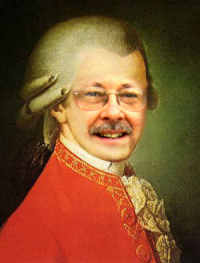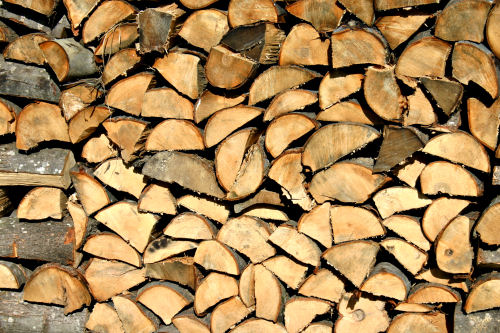A 365-Day Project
"We Are All Mozart"
A project to create
new works and change
the perception of the
music of our time.


 October 6, 2006
October 6, 2006 
Tonight there will be performances of several wonderful composers, including five premieres. The Vermont Contemporary Music Ensemble (whose name I've campaigned for years to change into something actually interesting) will be playing music of Allan Blank, David Gunn, Thomas L. Read, Belinda Reynolds, Patricia Julien, and me. Oh, and Francis Poulenc. The audience fodder.
If the night is not too late, I'll add to this post later with some commentary about the concert. In the meantime, I'll talk about the challenges of composing and performing my composition Eventide, and in the process offer (I hope) some insights into the why of creating it. The first, third and fourth movements will be played tonight. (For those in reach, tonight's performance is in Montpelier, Vermont, at the Unitarian Church, and tomorrow in Colchester, Vermont, at St. Michael's College McCarthy Arts Center. Both concerts are at 8 pm.)
Eventide is an eight-movement suite that explores the extremes of instrumental playing -- range, speed, intonation and articulation -- of piccolo, small (E-flat) clarinet, and contrabassoon. The first movement is a time-suspended chant of call and response, with one simple theme exchanged among the instruments to introduce themselves and their sounds. It is flexible in how it deals with the beat, and jumps immediately into the piece's single greatest challenge: intonation.
A hot modal swing follows in the second movement, pressing the limits of articulation, especially for the contrabassoon; the movement is one single melodic stretch done entirely in octaves, trading back and forth syncopations to provide its three-part feel. An almost Baroque section features the piccolo in the concerto sense for the third movement, but with audible breaths and tongue sounds, all relaxed and full of coloratura ornamentation; in writing it, I was reminded (of all things) by my performances years ago of the slow movement of the Vivaldi concerto for piccolo recorder.
Hard, forward-pushing rhythms are the foundation of the fourth movement with a splashy (and breathless) piccolo solo atop the interlocking patterns of seven and eight; the movement breathes out in exhaustion. The fifth movement is hymn-like in its simple chords and melodies, using the suite's shared thematic motives in the clearest and most obvious way; it is this movement that pushes upward the most, with the high pitch extremes of all three instruments exposed at the end. Like a Bartók night music, the sixth movement features slowly sliding tones, spashes of color from the piccolo, and a stable clarinet foundation; the illusion is of time stopped. In complete contrast, the seventh movement pushes out an intense urban sound, full of syncopation and traded melodies. The final movement is a slow adieu in octaves -- a test of intonation, to be sure -- in a shifting modal melody that ends Eventide exactly as it began.
Steve Klimowski is the VCME's director. In a recent interview, he said, "Knowing Dennis, he would get creative with the extremes. He wrote eight pieces, and some of them were so hard that we couldn't even approach them in the amount of time we had." Indeed. And I don't feel bad about it at all. The group has a spotty history with my music; two pieces commissioned by them were never played, a third of another was played, and three-eighths of this one will be played. On the other hand, they played three others plus three that weren't commissioned by them at all. That's a lot of attention to just one composer, and I'm grateful for their belief in my work -- and for the relationship that lets me toss some tough stuff their way.
In the Great Ocean of new nonpop, Eventide is a trifle. What made it a challenge and a pleasure to write was imagining the sonorities with instruments at the extremes. Having played in a large wind ensemble, I knew full well how difficult the intonation would be, particularly with the human ear itself finding exact intonation to be dicey at the extremes; a tuba and piccolo together in perfect intonation at the far ends of their ranges will cause the piccolo to sound flat. And as a bass clarinet player myself (in those days, anyway), I appreciate the limits of articulation in the low instruments. You can't make much musical sense playing fast 16th notes in the low register when there's hardly enough time to define the pitch itself.
The artistic challenge was to create eight movements that were unique in sensibility, and the performance challenge is rendering the score both accurately and musically. Though clever at first, three extreme winds get old very fast. Will they? Tonight, with only three movements, won't tell that tale.
* * *
"That doesn't look like Vermont. That looks like New York." Those two sentences are extracted from three very interesting and extensive reactions from composer and actor Robert Bonotto. He was referring to yesterday's photo of a wine cellar at the Vermont General Store.
More about Robert's reactions tomorrow, but for now I'm about to take Robert out of context in order to make a point that I failed to make well yesterday, which was that we do not have to be unwitting victims of our tools or our circumstances. These small country and general stores in Vermont did not suffer the same fate as those in Ireland or Kansas because the storekeepers were not only experienced in dealing with the winds of change, but also (aside from being a contrary lot) because there was nowhere else to go. Like artists, they have faced change by changing, not by stopping -- and the communities that have found them central to their lives have responded by remaining customers. Supermarkets, interstate highways, convenience stores, government regulations, and big box stores have each threatened their survival.
That is why a store will today will have an ATM, FedEx pickup, public internet terminal and mail-order business along with a post office, horse hitch, hunting reporting station and plumbing supplies. A wine section to complement the beer, microbrews to complement the Budweiser, energy drinks next to the soda. And a wine cellar or brick bread oven. (Here. Read more about all this.) Glossy magazines promote the beauty of fall leaves and the excitement of skiing without ever revealing the seamy subtext of poverty, abuse, and exhaustion. Conservative rebellions such as "Take Back Vermont" are a family squabble hidden from outsiders. It is all part and parcel of the inevitability of change and lifelong struggle to accommodate it -- or even lead it.
Composers face this challenge, especially if they have been around for awhile as I have, running an academy-free life sans a built-in contingent of performers, acolytes and colleagues. To be personal for a moment: I would like to remain meaningful as a composer, to continue to speak with a sonic voice that does not crack and shatter with age. Certainly I can't retire, so long as the imperative to write exists. And, of course, there is no money with which to retire. An unending desire for freshness infuses each composition, whether or not it succeeds. It is a fool's quest, yet I cannot countenance remaining in my own past as Stockhausen has been mired in his, or as the generational pop audiences have, pining away inside their souls for the lost chords of their youth. The past is of historical interest, even my own. Sure, I would like to be 'vindicated', if that's the word, as a composer. I'd like my groundbreaking contributions of ten and twenty and thirty years ago to be recognized, as they might have been had I remained in New York. But I can't predicate my composition on that past, whether or not it is informed by those experiences. I loathe the stylistic wallower.
Indeed, some of my newer compositions may even sound like new romanticism, but they are part of a milieu, a landscape and environment that are temporally and stylistically alien from my highly energized developing years when atonalism and knottiness were in vogue. I would no more write a Penderecki Threnody today than I would write a Mozart Exsultate. In other words, my music doesn't sound like Dennis I. It sounds like Dennis VI. I do not yearn for those years, save for the higher physical energy I could bring to making the work -- fortunately compensated for by an advancing toolset that relieves some of the labor. Even if I can't be forever young, I can seek to be forever chameleon.
So tonight will bring the premiere of Eventide sounding three of its eight distinct styles, none of which I would have or would have wanted to write as a young composer. Looking into the future from the past, I would have hated my work. Looking into the past from the present, I don't much care.

Our woodpile is ready for the winter. It looks pretty, but for us it's a herald of six months of struggle.